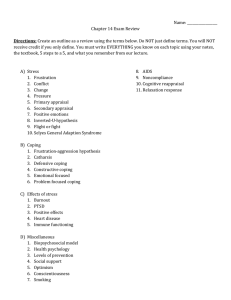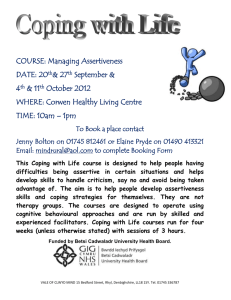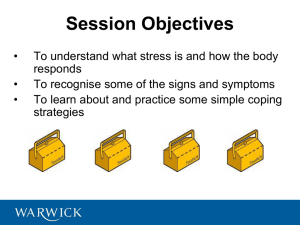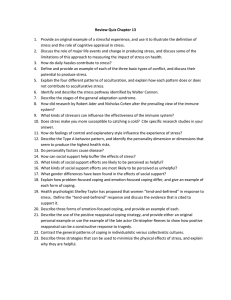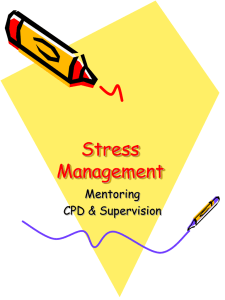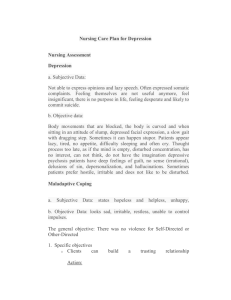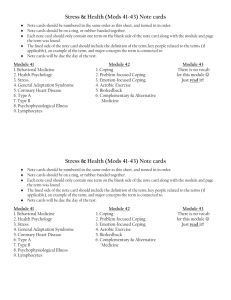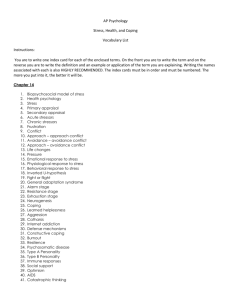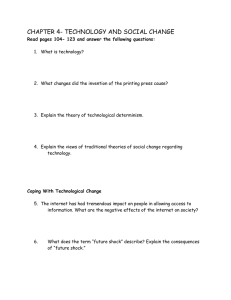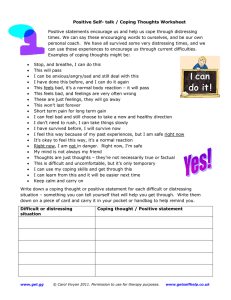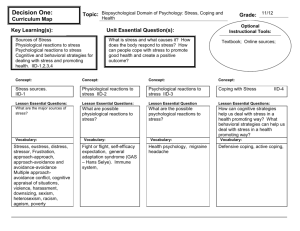Coping with Stress and Crisis
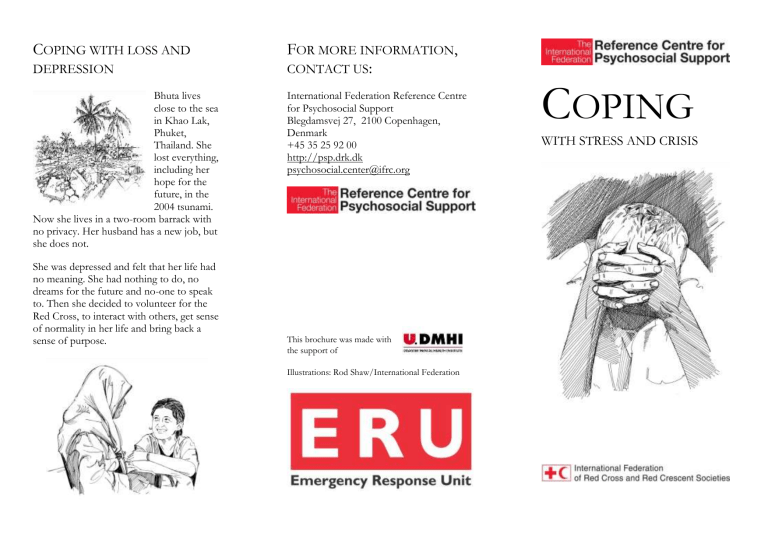
C
OPING WITH LOSS AND
DEPRESSION
Bhuta lives close to the sea in Khao Lak,
Phuket,
Thailand. She lost everything, including her hope for the future, in the
2004 tsunami.
Now she lives in a two-room barrack with no privacy. Her husband has a new job, but she does not.
She was depressed and felt that her life had no meaning. She had nothing to do, no dreams for the future and no-one to speak to. Then she decided to volunteer for the
Red Cross, to interact with others, get sense of normality in her life and bring back a sense of purpose.
F
OR MORE INFORMATION
,
CONTACT US
:
International Federation Reference Centre for Psychosocial Support
Blegdamsvej 27, 2100 Copenhagen,
Denmark
+45 35 25 92 00 http://psp.drk.dk psychosocial.center@ifrc.org
This brochure was made with the support of
Illustrations: Rod Shaw/International Federation
C
OPING
WITH STRESS AND CRISIS
E
XTREME STRESS
Everyone who has lived through a crisis situation will most probably experience extreme stress. Such stress usually causes unpleasant reactions.
This brochure highlights common reactions to extreme stress and gives suggestions on how to cope with them.
F
EATURES OF STRESS
Stress is a state of pressure or strain that affects body and mind. It can be caused by any positive or negative change. Stress is an ordinary feature of everyday life and is positive when it makes a person perform optimally e.g. at an exam.
When faced with a strong or sudden emotional and physical strain, such as a crisis situation, most will experience extreme stress. Ordinary negative stress may accumulate over a period of time and become a negative spiral. Extreme stress can seriously affect a persons’ health, working ability and private life.
R
EACTIONS TO STRESS
It is normal to react when experiencing an abnormal situation. This is important to remember when experiencing stress reactions.
Reactions to extreme stress vary. Typical physical reactions include sleeping problems, headaches, muscle tensions and bodily pains, fast heart beat and nausea.
Typical emotional and behavioural reactions are anxiety, watchfulness and poor concentration, and negative feelings such as guilt, sadness and anger.
Other common reactions include to become disoriented, have intrusive memories and try to avoid being reminded of the crisis situation. Some also react by not feeling anything at all, by having difficulties in making decisions or by isolating themselves from others. Some people increase their intake of alcohol, medicine or drugs to escape the pain they are feeling.
C
OPING WITH STRESS
Extreme stress reactions will most likely affect your health and daily life, both at work and privately. Coping with and recovering from the effects of a crisis situation can take a long time. Coping is the process of managing difficult circumstances and finding ways of minimizing or tolerating the effects of stress.
It is important to find ways of coping with the stress reactions. It may help to:
Remember that stress reactions are normal reactions to an abnormal situation
Allow yourself to feel sad and grieve
Maintain daily routines and do things that normally give you pleasure
Eat healthy foods, get sleep and exercise if possible
Socialize with other people instead of withdrawing
Seek support and assistance
Accept assistance that is offered
– Exercise if possible.
W
HEN TO SEEK
PROFESSIONAL HELP
The stress reactions described in this pamphlet may last several weeks. If the reactions persist and make it impossible to function normally over a long period of time, seek help. One option is to contact the local health facility or the Red Cross Red
Crescent emergency response unit.
